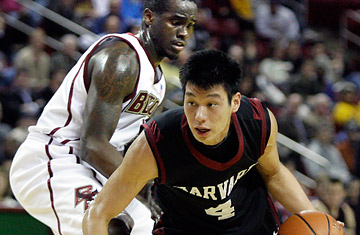
Harvard's Jeremy Lin drives by Boston College's Biko Paris during the first half of an NCAA basketball game in Boston on Dec. 9, 2009
On a bone-chilling January afternoon on the banks of the Charles River, Harvard's man of the moment is hard at work. He's neither the editor of the law review nor a Nobel laureate on the verge of another scientific breakthrough. Instead, Jeremy Lin is at the Lavietes Pavilion, the cramped home of the Harvard men's basketball team, making life miserable for the Dartmouth Big Green. During a typically athletic play in the second half, Lin strips the ball from an unsuspecting Dartmouth guard, dribbles down the floor and flushes home a ferocious dunk. The crowd explodes. Harvard hoops has never been hotter.
It's been 64 years since the Crimson last qualified for the NCAA men's basketball tournament. But thanks to Lin, that ignominious streak could end this year. The 6-ft. 3-in. (1.9 m) senior, who paces Harvard in points (17.0), assists (4.7) and steals (3.0) per game, has led the team to a 12-3 record, its best start in a quarter-century. Lin's well-rounded game--he throws deft passes, is a tough defender and can probably leap over the Charles in a single bound--has earned him a nomination for the Wooden Award, given annually to the best college player in the country. "He's as good an all-around guard as I've seen," says Tony Shaver, head coach at the College of William & Mary, which in November lost a triple-overtime game to Harvard after Lin hit a running three-pointer at the buzzer. "I wouldn't be surprised to see him in the NBA one day."
As a pro-level talent at a school more renowned for its academic superstars, Lin is a novelty. But his ethnicity has drawn as much attention as his exploits on the court. Fewer than 0.5% of men's Division I basketball players are Asian American. There are only two NBA players from the Far East--giants Yao Ming of the Houston Rockets and Yi Jianlian of the New Jersey Nets. In 1947, Wat Misaka, a Japanese American, became the first non-Caucasian NBA player, but since then, few Asian Americans have tried to follow his lead.
The Asian community, both in the U.S. and abroad, is starting to take notice of Lin. Four television networks from Taiwan, where Lin's parents were born, covered the Harvard-Dartmouth game. A group of Bostonians, all Asian-American 20-somethings, also organized a trip to Lavietes to check out their cult hero; one toted a sign that read JEREMY LIN 4TW (for the win). And when Lin returned home to the San Francisco Bay Area in early January for Harvard's game against Santa Clara University, so many Asian Americans came out to support him that his teammates joked that the arena looked like Hong Kong. "It's overwhelming," Lin says of the attention, "and it's still shocking."
What's most shocking, however, is that some observers hold his ethnicity against him. Though he hails from Division I's top academic conference--and plays in front of fans purported to be among the U.S.'s future leaders--Lin is the target of cruel taunts everywhere he goes. "It's everything you can imagine," he says. "Racial slurs, racial jokes, all having to do with being Asian." According to Harvard teammate Oliver McNally, another Ivy League player called Lin a derogatory name during a game last season. At a December road loss to Georgetown, McNally says, a spectator yelled, "Sweet-and-sour pork!" from the stands.
